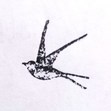What I’ve Been Reading – September 2025 Edition
Never mind what I’ve been writing – what have I been reading?
I haven’t done one of these posts in… wow, over a year. I can confirm that despite this I have been reading a lot of books, and I have been leaving reviews for my fellow indies as I go. For the last few months and the most part, though, I have been reading a lot of comics, for two main reasons: the Superman movie came out and spurred me to devour a bunch of those comics; and because I got a new iPad and so I could actually read comics in higher fidelity, and thus I did. A lot. I will not, however, spend this entire post talking about Superman again, because I have some much bigger highlights of the last few months of reading.
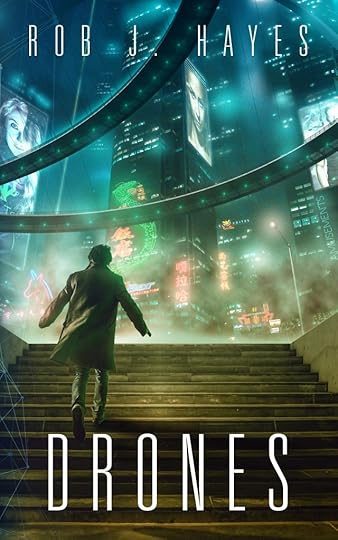
Let’s start with a nice bit of indie SF: Drones by Rob J. Hayes. Welcome to a future dystopia where there’s a black market for human emotions. It’s a very solid premise and has a lot of room for interesting stories, and Hayes does a good job of exploring some of them – though not all, and I hope that maybe one day he thinks about going back for more. We follow emotion-mule and former spec-ops bloke Garrick, whose effective addiction to not having any emotions, while needing to go out and feel desirable ones, is a really strong centre for the story. Like I said, it’s a really strong core idea and I’d love to read more about it. In fact it’s such a strong idea that a similar-but-different dystopia is the subject of one of my own upcoming stories. Great minds, or something. Very much worth reading.
Next, and actually my most recent read, was The Mars House by Natasha Pulley. Pulley’s previous books are some of the best writing I have ever encountered; The Watchmaker of Filigree Street and its sequels are absolutely beautiful. It’s a good bit of prose that can make me cry. The Mars House is not quite on that level, but it’s still really well written. And again, it’s another book with a great core concept: normally, when humans get sent to Mars in SF, their power in low gravity is a good thing. In The Mars House, ‘Earthstrong’ humans are literally banned from going outside unless they restrict themselves physically, because if they don’t then they end up accidentally punting frail Mars-born humans through walls with light slaps.
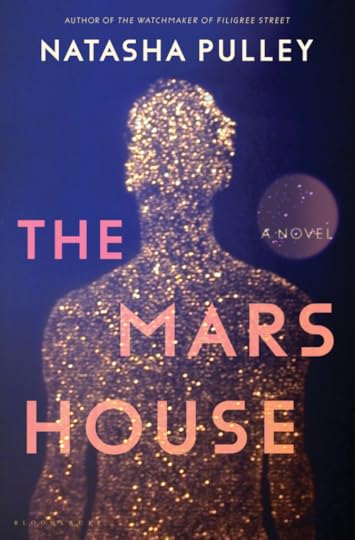
Much politics, of course, ensue, and the story follows an Earth-born ballet dancer reluctantly living alongside a Mars-born, bigoted, anti-Earther politician. It’s all a delicate and well-written allegory for all sorts of current social issues, especially immigration and xenophobia. But it doesn’t quite go the way I would have expected such a book to go, at various points, and I’m not completely sure how I feel about the ending, though overall it’s probably positive. These are delicate issues, after all, and there’s a lot of ambiguity in Pulley’s presentation. However, there are also talking mammoths, and this is excellent.
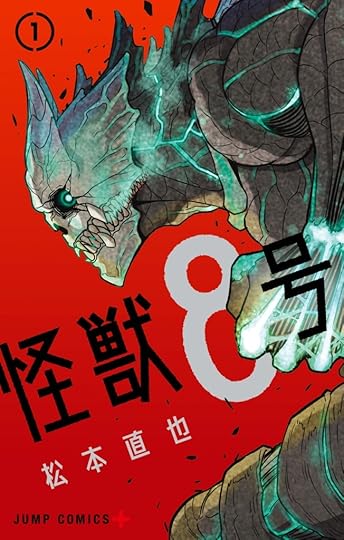
Now I know I said I wouldn’t talk about comics, and technically I am talking about manga, which is different, honest, but I can’t not talk about these two. Kaiju No. 8 by Naoya Matsumoto is a cracking series, at least for the first 4 volumes that I’ve read. (Someone else appears to be very slightly ahead of me on my digital library app so I’m sitting and staring at the next few volumes on hold and waiting.) To summarise the plot: kaiju regularly show up around Japan and the world, which leads to two things. Firstly, a Kaiju Defence Force with awesome power-suits and crazy weapons running around blowing the giant monsters up… and secondly, an entire industry devoted to cleaning up their mess.
Straight away, I love it, and part of me wishes that said cleanup crew had their own full series because it’s stuffed with potential. The main series, however, follows two Kaiju cleaners who apply to join the Defence Force, and get to use their experience in cleaning up the mess to their advantage over their professional soldier colleagues.
But of course one of them is turned into a Kaiju after a big fight, and can’t let anyone know, because they’ll take him into a back alley and blow his head off. Given his new powers make him superhuman, and he has to keep using them to save his friends and the city, this is not ideal. So far this is a really solid manga – with great artwork, of course, but a cracking premise that keeps delivering. I still want Kaiju-cleaner shenanigans as its own series, though.
And the second manga, before I get to my highlight of the last few months of reading, is Cat + Gamer by Wataru Nadatani (and translated by Zack Davisson). It’s about a gamer who gets a kitten. The kitten is adorable. Later on, another kitten shows up. It is also adorable. There are shenanigans, and the art is lovely, and it’s just extremely wholesome. If you just want to read something that makes you feel better, read this manga.
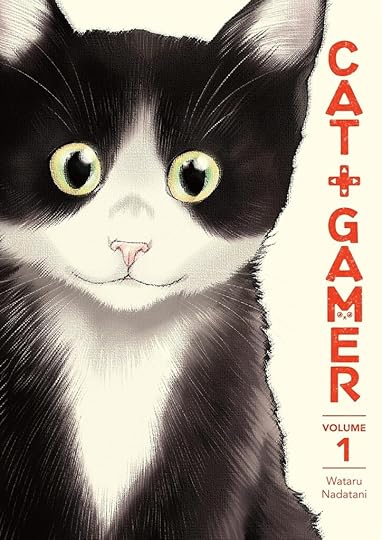
Finally, then, some stories that I really did not expect to be this damn good. I have read a lot of Warhammer 40,000 books. I have read standalone 40k books, which are excellent, and I have read standalone 40k books were released to promote new games or sets, which are really, really not. So when I picked up the Blackstone Fortress anthology, largely by Darius Hinks but with short stories by half the Black Library stable, and written specifically to build more hype for the Blackstone Fortress boxed game, I expected ‘fine’ at best and ‘awful’ at worst.
Blackstone Fortress and Blackstone Fortress: Ascension are among the best 40k books I have ever read.
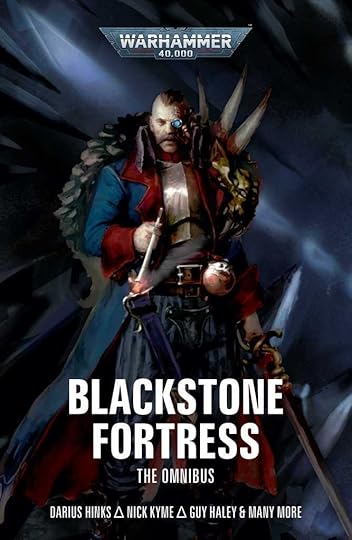
There are ancient space stations, out in the dark reaches of the galaxy; moon-sized constructs wrought by hands unknown, lying dormant for now, but with the power to crack planets in half when roused. These are the Blackstone Fortresses. This one in particular is a new mystery. Its corridors are ever-shifting, its technology unknowable; it is ancient beyond imagining and deadly even to set foot upon. But it is filled with secrets, with treasures beyond value, with technology and knowledge that could change the galaxy. And so a whole society has built up on the ramshackle Precipice station, around those bold treasure-hunters who dare to brave the Blackstone to seek their fortunes… if they come back, of course.
It’s a cracking idea to start with, and like the best 40k stories it would be a really good bit of SF without having to have Space Marines turn up at some point or people shouting about the Emperor. But Precipice is not your average 40k setting: normally literally everyone in the galaxy hates each other, to the point of the Imperium largely shooting all aliens and most other humans on sight. On Precipice, however, things are different. Human and alien and even heretic will – however reluctantly – work side-by-side to plumb the depths of the Blackstone Fortress. Its treasures are worth the xenophobia, basically, and this leads to fantastic interactions that would almost never happen anywhere else in the vast 40k universe. The main characters include a pompous space-dandy, a pair of literal fire-and-brimstone priests, a flesh-eating birdman and two sniper hobbits, who all dislike each other intensely but like the Fortress more. And because the Fortress is such a mystery, because the whole point of the game and the setting is that it’s unimaginably weird, there is no baggage from the overarching lore. Evil space elves can drink at the same bar as their deadly enemies, the normal space elves. Yes, eventually the weird Chaos cultists show up, and nobody likes them, but even so, that’s everyone else versus Chaos, which normally devolves into everyone versus everyone else. And of course there are betrayals, and plots, and schemes, but they are interesting ones, not just for the sake of someone being from a different faction to someone else.
My only criticism, really, is that whoever formatted the omnibus edition I read decided that they would put the first book first, then the second book, and then all of the standalone short stories that fill the gaps between the two. This is a terrible order to read them in. If you decide to pick up Blackstone Fortress, read book 1, then the short stories, then the concluding novel.
It feels like someone at Games Workshop told Darius Hinks that this was his corner of the 40k galaxy and he could just go and play, and he did, and it was excellent. From such things are the best 40k stories made – that’s how we got Dan Abnett’s Inquisition and Gaunt’s Ghosts books, which are the very best in 40k fiction. It’s good sci-fi that happens to be set in the 40k universe. And it gets real weird in parts, and that’s all to the good. Even if you don’t like Warhammer, this is a good book.
There will be more posts like these in the future. I read a lot, and when it’s good, I like talking about it. I have some stuff queued up on my Kindle from the Narratess sale that I haven’t started yet but have a good feeling about, and plenty more besides. There are always more books to read.

